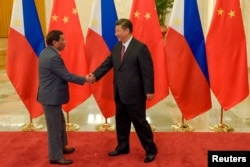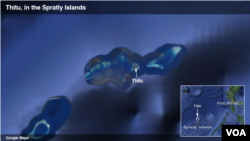A Philippine opposition party legislator has been drawing attention for the release of privileged information that suggests China is infringing on offshore islets that the two countries dispute, a potential threat to a recently strengthened diplomatic relationship.
But some people reading his feed suspect personal political motives, including an effort to weaken President Duterte.
Congressman Gary Alejano is using social media to spread intelligence gathered on Chinese activity in the South China Sea. The former marine captain elected in 2013 charged China had planted its flag on a sandbar in Philippine-controlled waters in late July and in mid-September chased a Philippine patrol vessel away from three sandbars in the same waters.
Showing the public
Alejano is giving out this information on Facebook and Twitter to remind Filipinos to be careful of their friendship with China forged under Philippine President Rodrigo Duterte over the past year.
“This administration and even the government in China are saying that everything is already OK now that we’re talking with each other,” the congressman told VOA in a phone interview.
“There are so many things happening in the West Philippine Sea [South China Sea] that are not coming out in the open, and I don’t want that the government would just be silent and do nothing," he said.
Duterte and his foreign affairs secretary acknowledged the report of a Chinese flag at Sandy Cay but said China had not occupied it.
The cay is within 22 kilometers of Philippine-held Thitu Island, part of the Spratly archipelago. The roughly 100 Spratly features belong to the bigger South China Sea.
After Alejano’s claims about the chased patrol boat, the defense secretary told Philippine media it was “natural” that China would be spotted in the Spratlys.
Beijing claims more than 90 percent of the sea extending from its south coast to Borneo. It has alarmed four rival claimants in Southeast Asia by letting coast guard vessels operate in disputed waters and by building artificial islands, some for possible deployments of radar systems and combat aircraft.
Brunei, Malaysia and Vietnam as well as the Philippines contest many of China's maritime claims.
“This is something that the Philippines must be watchful for,” Alejano said on Facebook Oct. 4 after charging that Chinese boats used sirens to chase away the Philippine patrol vessel. “While the country is talking with China, we should not let our guards down.”
That post had received 540 likes, 346 shares and 50 comments as of mid-Wednesday.
Since a world arbitration court ruled last year against the legal basis for much of China’s claim, the Beijing government has tried to get along with other countries.
Duterte set aside the Philippine maritime dispute with China after taking office in June 2016, to diversify Manila’s foreign policy. In October 2016, China pledged $24 billion in aid and investment to the Philippines, which wants outside help with a five-year infrastructure development plan.
Getting attention
Alejano’s reports have gotten attention from a Supreme Chief justice as well as overseas scholars, including one from the Washington-based RAND Corp., who follow South China Sea issues.
“For the academia, of course we’re listening because his sources of information would be reliable,” said Jay Batongbacal, director of the Institute for Maritime Affairs and Law of the Sea at the University of the Philippines. “My suspicion is he’s getting this information from frustrated military people who are concerned about what’s going on in the Spratly region.”
Alejano acknowledged “friends” in the military but declined to disclose his sources. He said he talked to fishermen in March and April to document what he called "harassment" by the Chinese.
Calling attention to Chinese activity in the sea should deter China from testing its luck, said Collin Koh, a maritime security research fellow at Nanyang Technological University in Singapore.
“I think to some extent he will serve as sort of a deterrent, because one thing is that if you look at the previous modus operandi, the Chinese will always want to bet on the other victim keeping quiet and trying to keep a low profile, not playing these incidents, not even publicizing it,” Koh said.
China also has vexed countries such as Indonesia and Malaysia by moving ships through disputed waters despite overall friendly ties. Those countries seldom challenge China in public.
Alejano also filed a complaint earlier this year to impeach Duterte after learning that the president knew Chinese research vessels had parked off the Philippine Pacific coast in 2016.
The government sometimes withholds information, he said. “We want to Duterte to be accountable to the people,” he said.
Ulterior motives?
Alejano, who is allied with former anti-government protester and Sen. Antonio Trillanes, may be seeking attention through social media to win a future Senate race, some analysts believe. Alejano said he had not made such plans.
“I wouldn’t bring much credence to this guy. His group is out to bring down President Duterte, that’s very clear, and he wants to inherit the mantle of Sen. Trillanes, by posing as a tough guy,” said Eduardo Araral, associate professor at the National University of Singapore’s public policy school.
But academics say his reports will likely keep coming — and being heard.










